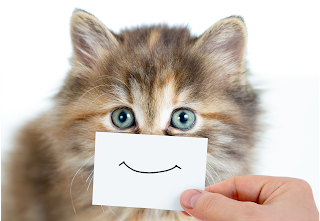Cats are independent animals, but they still need attention and care to be happy. Here are some tips to make your cat happy:
1. Provide plenty of toys: Cats love to play, and toys can keep them entertained when you're not around.
2. Give your cat plenty of attention: Cats enjoy being petted, brushed, and played with. Spend some quality time with your cat every day.
3. Provide a comfortable place to sleep: Cats like to have their own cozy space to sleep in. Make sure your cat has a comfortable bed or a cozy spot to curl up in.
4. Provide healthy food and fresh water: A healthy diet is important for your cat's well-being. Make sure your cat has access to fresh water at all times.
5. Keep the litter box clean: Cats are clean animals and prefer a clean litter box. Make sure you clean the litter box regularly.
6. Give your cat a safe outdoor space: If your cat is allowed to go outside, make sure the area is safe and secure.
7. Provide scratching posts: Cats need to scratch to keep their claws healthy. Provide a scratching post or pad to protect your furniture.
8. Take your cat to the vet regularly: Regular checkups are important to keep your cat healthy and happy.
9. Allow your cat to explore: Cats are curious animals and enjoy exploring their surroundings. Provide opportunities for your cat to explore and play, such as a cat tree or a cardboard box.
10. Give your cat a view: Cats love to look out the window and watch the world go by. Provide a perch or a window bed for your cat to relax and enjoy the view.
11. Provide variety: Cats can get bored with the same toys and activities. Provide a variety of toys and activities to keep your cat engaged and stimulated.
12. Use positive reinforcement: Positive reinforcement can be a powerful tool in training your cat. Reward good behavior with treats, toys, or praise.
13. Respect your cat's boundaries: Cats are independent animals and need their space. Respect your cat's boundaries and don't force interactions if your cat is not in the mood.
14. Play soothing music: Some cats enjoy listening to soothing music. Play calming music to help your cat relax and feel at ease.
15. Consider adopting a second cat: Cats are social animals and can benefit from having a feline companion. Consider adopting a second cat if you have the resources to care for another pet.
Remember that every cat is unique, and what works for one cat may not work for another. Take the time to observe and understand your cat's behavior and preferences, and adjust your care accordingly.
Why Is My Cat Sad?
It can be difficult to determine why a cat is sad or unhappy, as cats are not able to communicate their emotions in the same way that humans do. However, some common reasons why a cat may appear sad include:
- Illness or pain: Cats may display sadness or lethargy if they are sick or in pain. If you suspect that your cat may be ill or in pain, it is important to take them to a veterinarian for a check-up.
- Stress: Cats are sensitive animals and may become stressed or anxious if their environment is disrupted or if they are not receiving enough attention or stimulation. Changes in routine, such as a move or the introduction of a new pet, can also cause stress in cats.
- Boredom: Cats need stimulation and may become bored if they do not have enough toys or activities to keep them occupied. Providing your cat with toys, scratching posts, and opportunities to play can help alleviate boredom.
- Lack of socialization: Some cats may appear sad if they are not receiving enough attention or socialization. Make sure to spend quality time with your cat every day and provide opportunities for interaction and play.
- Aging: As cats age, they may become less active and may experience health issues that can make them appear sad or lethargic.
If you are concerned that your cat may be sad or unhappy, it is important to observe their behavior and consult with a veterinarian if necessary. Your veterinarian can help rule out any underlying health issues and provide guidance on how to improve your cat's well-being.
Why Is My Cat Not Eating?
There are several reasons why a cat may not be eating, some of which may be temporary or minor, while others may indicate a more serious underlying condition. Here are a few possible reasons:
- Illness or Pain: Cats may stop eating if they are feeling unwell or experiencing pain. Dental problems, gastrointestinal issues, kidney disease, or infections are common causes of appetite loss in cats.
- Change in diet: A sudden change in your cat's food or routine can also cause them to lose their appetite. If you recently switched to a new brand of cat food, for example, your cat may need some time to adjust to the new taste and texture.
- Stress: Cats can become stressed for a variety of reasons, such as changes in their environment, the addition of a new pet or family member, or a move to a new home. Stress can cause a loss of appetite in some cats.
- Age: As cats age, they may lose their sense of taste or smell, which can make food less appealing. Additionally, older cats may have dental issues or other health problems that make eating difficult or uncomfortable.
If your cat hasn't eaten for more than a day, it's important to take them to the vet for a checkup to rule out any underlying medical conditions. Your vet can help you identify the cause of your cat's loss of appetite and recommend appropriate treatment.
Tags
Animals


